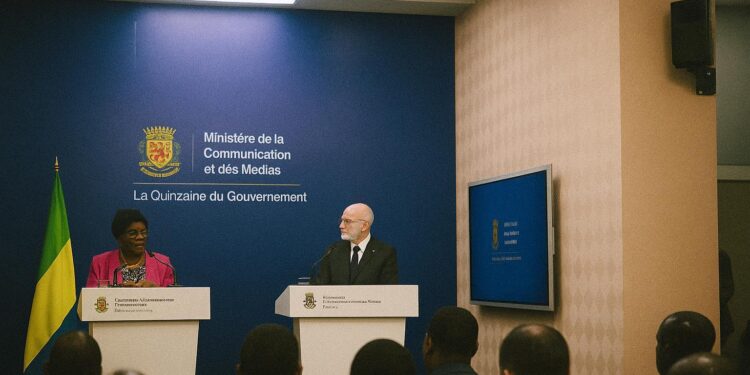Recalibrating Social Protection in Congolese Schools
The Republic of Congo is preparing a policy pivot that places professional social workers at the heart of its educational system. Marie Cécile Mboukou Kimbatsa, Minister of Social Affairs, Humanitarian Action and Solidarity, disclosed during the recent Government Fortnight in Brazzaville that “assistants sociaux” will be posted not only in reference hospitals but also across public schools nationwide. The stated ambition is to identify, counsel and direct vulnerable pupils toward appropriate care before socioeconomic fragilities metamorphose into chronic exclusion.
From Hospital Wards to Classroom Corridors
Social assistance is already entrenched in the country’s flagship medical facilities such as the Brazzaville University Hospital Centre, Djiri General Hospital and Makélékélé Base Hospital, where workers log incoming patients who arrive without financial capacity for treatment. According to the ministry, the forthcoming school-based deployment replicates that model, tasking social workers with compiling social files, coordinating with teachers and liaising directly with the ministry for prompt underwriting of medical prescriptions or urgent interventions.
Officials argue that an early-warning mechanism inside schools can mitigate drop-out rates and health-related absenteeism that, according to Unesco Institute for Statistics, reached nearly twenty percent in certain rural prefectures (UIS 2023).
Mapping Vulnerability beyond the Capital
The reform resurrects the cartography of need created under the World Bank-backed “Lisungi” social safety-net programme, launched in 2014 to serve Brazzaville, Pointe-Noire and Dolisie (World Bank 2021). While Lisungi was lauded for conditional cash transfers and school-fee waivers, its geographic footprint remained narrow. Its successor, the nationally branded “Filets Sociaux”, inherits the database yet has struggled to expand coverage because of fiscal constraints induced by the pandemic and shifting oil prices.
By relocating professional staff into every district’s schools and hospitals, the ministry hopes to create fresh longitudinal data that will refine household targeting and unlock multilateral co-financing. Diplomats attest that reliable social registries often reassure partners such as the African Development Bank or UNICEF, whose child-protection budgets hinge on verifiable indicators.
Synergies with the National “Filets Sociaux” Initiative
Officials inside the Directorate-General for Social Affairs emphasize that the school-based cadre is conceived as an operational arm of the broader Filets Sociaux architecture rather than a parallel bureaucracy. They cite a forthcoming inter-ministerial decree that will codify referral pathways from classroom to community clinic, complete with digital case files accessible to provincial social-affairs offices.
In private conversation, a senior planner suggested that the model could eventually dovetail with Congo’s nascent health-insurance scheme, whereby a child flagged by a school social worker would automatically receive a temporary insurance card pending parental means testing. Such convergence resonates with regional best practices documented by the Economic Community of Central African States (ECCAS 2022).
Regional Humanitarian Pressures and Governance
The policy is also framed against a backdrop of continued arrivals of refugees fleeing insecurity in the Central African Republic, the Democratic Republic of Congo, Chad and Sudan. UNHCR enumerates roughly 66,000 refugees presently on Congolese soil, half of whom are Central African nationals (UNHCR 2023). Many find themselves in proximity to border-zone schools where capacity is already stretched.
Brazzaville’s decision to professionalise social assistance therefore carries diplomatic resonance: it signals to international partners that Congo intends to shoulder a fair share of the humanitarian burden, even as petroleum revenues remain volatile. An EU official posted in Pointe-Noire described the move as “a pragmatic gesture that will facilitate donor coordination and possibly unlock additional budget support.”
Prospects for Implementation and International Partnership
Execution, however, will hinge on budgetary outlays for salaries, supervisory training and data-management software. The ministry acknowledges the need for an estimated 1,200 social workers to cover the first phase of deployment, a figure that exceeds current human-resource rosters. Discussions are underway with the National School of Administration and Magistracy to accelerate a tailored training track in social work, while the World Bank has signalled interest in mobilising technical assistance through its Human Capital Project envelope.
Stakeholders in the diplomatic community view the reform as coherent with President Denis Sassou Nguesso’s commitment to inclusive growth under the National Development Plan 2022-2026. By weaving social protection into the daily fabric of schools and hospitals, the government aims to operationalise the constitutional principle of solidarity and to translate macroeconomic recovery into micro-level resilience.
Navigating the Road Ahead
While the initiative is unlikely to vanquish poverty overnight, its institutionalisation of social work in core public services constitutes a structural investment whose dividends are measured in human capital rather than quarterly metrics. For Congo’s international partners, the emerging architecture offers a platform for calibrated engagement, rooted in the practical imperative of identifying and supporting the country’s most vulnerable citizens from classroom to clinic.











































